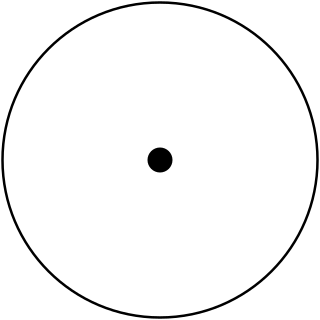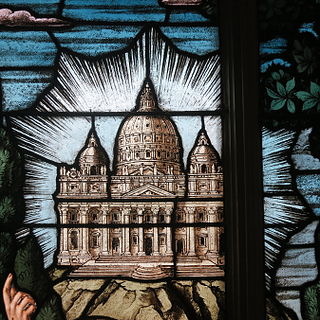Gnosis is the common Greek noun for knowledge. The term was used among various Hellenistic religions and philosophies in the Greco-Roman world. It is best known for its implication within Gnosticism, where it signifies a spiritual knowledge or insight into humanity's real nature as divine, leading to the deliverance of the divine spark within humanity from the constraints of earthly existence.
Love encompasses a range of strong and positive emotional and mental states, from the most sublime virtue or good habit, the deepest interpersonal affection, to the simplest pleasure. An example of this range of meanings is that the love of a mother differs from the love of a spouse, which differs from the love for food. Most commonly, love refers to a feeling of strong attraction and emotional attachment.

Monism attributes oneness or singleness to a concept, such as to existence. Various kinds of monism can be distinguished:
The teleological argument also known as physico-theological argument, argument from design, or intelligent design argument, is an argument for the existence of God or, more generally, that complex functionality in the natural world which looks designed is evidence of an intelligent creator.

Analogy is a comparison or correspondence between two things because of a third element that they are considered to share.

Friedrich Daniel Ernst Schleiermacher was a German Reformed theologian, philosopher, and biblical scholar known for his attempt to reconcile the criticisms of the Enlightenment with traditional Protestant Christianity. He also became influential in the evolution of higher criticism, and his work forms part of the foundation of the modern field of hermeneutics. Because of his profound effect on subsequent Christian thought, he is often called the "Father of Modern Liberal Theology" and is considered an early leader in liberal Christianity. The neo-orthodoxy movement of the twentieth century, typically seen to be spearheaded by Karl Barth, was in many ways an attempt to challenge his influence. As a philosopher he was a leader of German Romanticism. Schleiermacher is considered the most important Protestant theologian between John Calvin and Karl Barth.

Covenant theology is a Biblical Theology, a conceptual overview and interpretive framework for understanding the overall structure of the Bible. It is often distinguished from dispensational theology, a competing form of biblical theology. It uses the theological concept of a covenant as an organizing principle for Christian theology. The standard form of covenant theology views the history of God's dealings with mankind, from Creation to Fall to Redemption to Consummation, under the framework of three overarching theological covenants: those of redemption, of works, and of grace.
Because scholars have tended to use the term in different ways, Biblical theology has been notoriously difficult to define.
Theology of the Body is the topic of a series of 129 lectures given by Pope John Paul II during his Wednesday audiences in St. Peter's Square and the Paul VI Audience Hall between September 5, 1979, and November 28, 1984. It constitutes an analysis on human sexuality. The complete addresses were later compiled and expanded upon in many of John Paul's encyclicals, letters, and exhortations.
Mystici Corporis Christi(The Mystical Body of Christ) is an encyclical issued by Pope Pius XII on 29 June 1943 during World War II. Its main topic is the Catholic Church as the Mystical Body of Christ.
The "image of God" is a concept and theological doctrine in Judaism and Christianity. It is a foundational aspect of Judeo-Christian belief with regard to the fundamental understanding of human nature. It stems from the primary text in Genesis 1:27, which reads: "So God created man in his own image, in the image of God created he him; male and female he created them." The exact meaning of the phrase has been debated for millennia.

In Christianity, God is believed to be the eternal, supreme being who created and preserves all things. Most Christians believe in a monotheistic, trinitarian conception of God, which is both transcendent and immanent. Most Christians believe in a singular God that exists in a Trinity, which consists of three persons: God the Father, God the Son, and God the Holy Spirit. Christian teachings on the transcendence, immanence, and involvement of God in the world and his love for humanity exclude the belief that God is of the same substance as the created universe but accept that God the Son assumed hypostatically united human nature, thus becoming man in a unique event known as "the Incarnation".

The theology of Ulrich Zwingli was based on an interpretation of the Bible, taking scripture as the inspired word of God and placing its authority higher than what he saw as human sources such as the ecumenical councils and the church fathers. He also recognised the human element within the inspiration, noting the differences in the canonical gospels. Zwinglianism is the Reformed confession based on the Second Helvetic Confession promulgated by Zwingli's successor Heinrich Bullinger in the 1560s.

Sallie McFague was an American feminist Christian theologian, best known for her analysis of how metaphor lies at the heart of how Christians may speak about God. She applied this approach, in particular, to ecological issues, writing extensively on care for the Earth as if it were God's "body". She was Distinguished Theologian in Residence at the Vancouver School of Theology, British Columbia, Canada.
Christian theology is the theology – the systematic study of the divine and religion – of Christianity and Christian belief and practice. It concentrates primarily upon the texts of the Old Testament and of the New Testament, as well as on Christian tradition. Christian theologians use biblical exegesis, rational analysis and argument. Theologians may undertake the study of Christian theology for a variety of reasons, such as in order to:
Environmental theology pertains to "the God-environment relationship and divine expectations of human behavior in relation to the environment".

Catholic ecclesiology is the theological study of the Catholic Church, its nature, organization and its "distinctive place in the economy of salvation through Christ." Such study shows a progressive development over time being further described in revelation or in philosophy. Here the focus is on the time leading into and since the Second Vatican Council (1962–1965).

Teleology in biology is the use of the language of goal-directedness in accounts of evolutionary adaptation, which some biologists and philosophers of science find problematic. The term teleonomy has also been proposed. Before Darwin, organisms were seen as existing because God had designed and created them; their features such as eyes were taken by natural theology to have been made to enable them to carry out their functions, such as seeing. Evolutionary biologists often use similar teleological formulations that invoke purpose, but these imply natural selection rather than actual goals, whether conscious or not. Some biologists and religious thinkers held that evolution itself was somehow goal-directed (orthogenesis), and in vitalist versions, driven by a purposeful life force. With evolution working by natural selection acting on inherited variation, the use of teleology in biology has attracted criticism, and attempts have been made to teach students to avoid teleological language.

Asian feminist theology is a Christian feminist theology developed to be especially relevant to women in Asia and women of Asian descent. Inspired by both liberation theology and Christian feminism, it aims to contextualize them to the conditions and experiences of women and religion in Asia.
Dutch philosophy is a broad branch of philosophy that discusses the contributions of Dutch philosophers to the discourse of Western philosophy and Renaissance philosophy. The philosophy, as its own entity, arose in the 16th and 17th centuries through the philosophical studies of Desiderius Erasmus and Baruch Spinoza. The adoption of the humanistic perspective by Erasmus, despite his Christian background, and rational but theocentric perspective expounded by Spinoza, supported each of these philosopher's works. In general, the philosophy revolved around acknowledging the reality of human self-determination and rational thought rather than focusing on traditional ideals of fatalism and virtue raised in Christianity. The roots of philosophical frameworks like the mind-body dualism and monism debate can also be traced to Dutch philosophy, which is attributed to 17th century philosopher René Descartes. Descartes was both a mathematician and philosopher during the Dutch Golden Age, despite being from the Kingdom of France. Modern Dutch philosophers like D.H. Th. Vollenhoven provided critical analyses on the dichotomy between dualism and monism.









